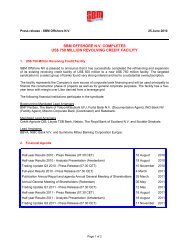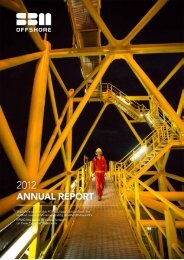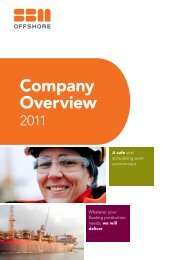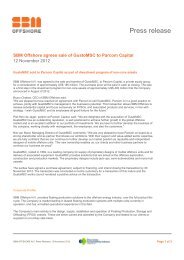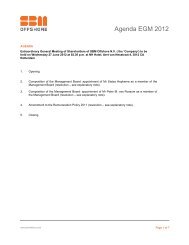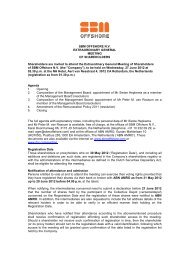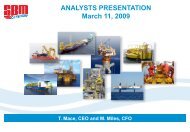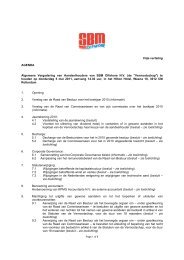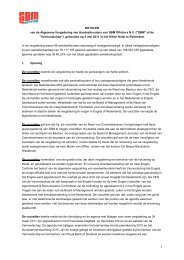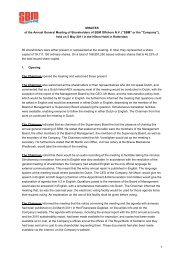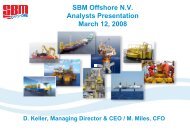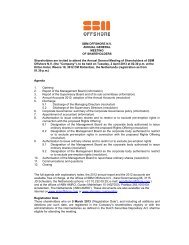Prospectus - SBM Offshore
Prospectus - SBM Offshore
Prospectus - SBM Offshore
Create successful ePaper yourself
Turn your PDF publications into a flip-book with our unique Google optimized e-Paper software.
contractual obligations. In countries where the Group is directly involved in activities such as engineering,<br />
construction or vessel operation, such events could affect the ability to secure revenues and meet objectives.<br />
Some operations take place in regions which present identifiable security risks, including piracy and terrorism.<br />
Acts of piracy on vessels have recently increased in frequency. Although the Group's fleet has not to date<br />
fallen victim to piracy, there can be no assurance that it will not do so in the future. Any such occurrence could<br />
adversely affect the Group's business. Acts of piracy have historically occurred in areas where the Group has<br />
operated, such as the West coast of Africa, or in areas where Groups assets may be in transit, such as the<br />
Indian Ocean or Indonesian waters, and there is a risk that acts of piracy will continue to occur in those areas,<br />
as well as other regions. The Group mitigates this risk through security arrangements and insurance, but in the<br />
future such arrangements may be unavailable, may only be available at increased costs or may prove to be<br />
insufficient or to provide insufficient coverage. In addition, crew costs could also increase if piracy continues<br />
to be a risk. Detention hijacking as a result of an act of piracy against the vessels, or an increase in cost or<br />
unavailability of insurance for the Group's vessels could have a material adverse impact on Group's business,<br />
results and financial condition.<br />
(k) The Group's current corporate transformation campaign may fail to meet objectives and generate<br />
risks (such as resistance to the transformation campaign by personnel) as well as ineffective<br />
processes or tools. If the Group is unable to deliver expected improvements the Group's business,<br />
results and financial condition could be adversely impacted.<br />
The Group launched in 2012 and continues to develop a transformation campaign aiming at improving the<br />
ways of working in line with the "Work as One, Perform and Shape the Future" strategy. The changes<br />
implemented by the Group include the delegation of responsibilities to five execution centres, merging of the<br />
Group's Turnkey Systems and Turnkey Services activities, streamlining of internal processes, systems and<br />
objectives and amendments to the Group's performance and evaluation system. The Group has significantly<br />
increased staff numbers (from 2,500 in 2004 to more than 7,000 in 2012) and has replaced 53 of the top 120<br />
senior managers since 1 January 2012. The Management Board members have changed, including a new CEO<br />
since 1 January 2012 and the creation of the new position of Chief Governance and Compliance Officer. The<br />
current Management Board have been working together for a relatively short time (since July 2012).<br />
There can be no assurance that the planned strategy will be successful, that the Group will not encounter<br />
difficulties or delays in implementing it, or that the Group's revised internal control systems and risk<br />
management will, once implemented, adequately identify all risks, or that the Group will properly assess the<br />
impact of such risks and address them in an adequate manner. As a result, the Group may suffer financial<br />
losses or damage to its reputation. This may have an adverse effect on the Group's business, results and<br />
financial condition.<br />
Changes to the Company's internal organisation and processes could affect morale and cause loss of motivation,<br />
reduced productivity, increased turnover of staff. There could be gaps and mistakes in execution or reporting<br />
due to changes in the organisation, processes or tools not having being adequately implemented. For example,<br />
changes in the information system the Group is using could affect performance and reporting during a<br />
transition period whilst staff and managers get used to different ways of working. Any of these factors could<br />
adversely affect the Group's business, results and financial condition.<br />
(l) The Group may not succeed in redeploying vessels at existing rate levels or at all, and may be<br />
subject to higher than anticipated demobilisation, refurbishment and redeployment costs.<br />
The Group's vessels are generally designed according to specifications from the customer. Lease and operate<br />
contracts are usually structured to secure an acceptable return on the investment within the contract period.<br />
When the lease contracts expire, or if they are terminated early, the Group may encounter difficulties<br />
redeploying those vessels at existing rate levels, or even redeploying those vessels at all. The Group currently<br />
has one FPSO, FPSO Falcon, that is not under contract. The redeployment of a vessel typically requires that it<br />
be refurbished and upgraded according to the specific requirements of the new customer contract, which<br />
involves additional cost. Also, the residual value of the unit may not end up being competitive in the market<br />
0105735-0000002 AMCO:5624830.1 30



